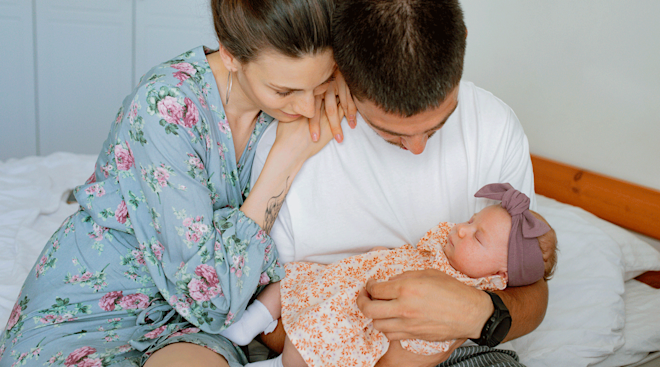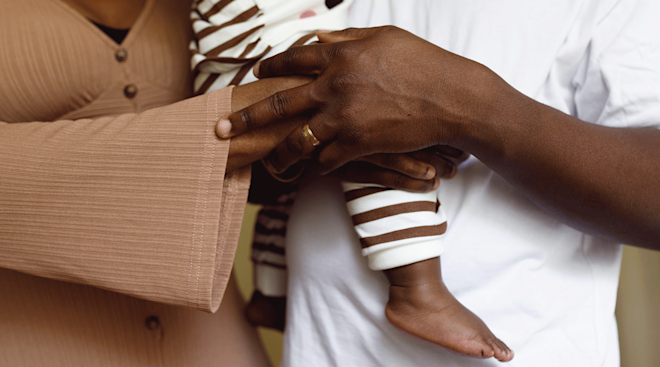Are You Guilty of Maternal Gatekeeping?
Do you have a habit of showing your partner how to put on a diaper the “right” way? Laughing with friends about the outfit your mother-in-law chose to dress your 3-year-old for daycare? Leaving four pages of instructions for your babysitter when you snag a night out? These behaviors sound like no big deal, but they could be signs you’re guilty of “maternal gatekeeping”—exhibiting behavior that drive would-be caregivers away, leaving you prone to irritation, anger and burnout. Sound familiar? We asked experts how to nip it in the bud.
Maternal gatekeeping is pretty much what it sounds like—as a mom, you serve as the ultimate gatekeeper for anything related to your infant or toddler, and that can include blocking other caregivers from getting involved. It’s natural to want to stay in control of your child’s care, but maternal gatekeeping can lead to a growing conflict between you and your partner, as well as mom burnout—after all, if you’re always watching over your child, even when it’s someone else’s turn to care for him, you’re going to feel exhausted and depleted by the end of the day.
Moms can exhibit maternal gatekeeping toward all types of caregivers, including in-laws, grandparents, nannies and babysitters. But it’s especially common with a partner. “It’s easy for moms to get in the pattern of maternal gatekeeping. Even in the most egalitarian relationships, moms tend to spend more time with their infants: They’re nursing, rocking, or holding, so they do get to know their infants needs faster than their partner may,” notes Wendy Faucett, a certified leadership parenting coach in San Diego. This is especially true if your partner goes back to work relatively quickly after baby is born. Because you spend so much time with baby, you may feel as if you’re the only one who can do certain things, like give her a bottle or put her to sleep. But this makes it hard for others to step in to help out or follow through on their job.
Common examples of maternal gatekeeping include:
- Looking over your partner’s shoulder as they’re taking care of baby
- Giving directions pre-emptively rather than letting the person figure it out themselves
- Turning down plans since only you can put baby to bed or give baby a bottle
- Critiquing how the other person completes a task like bottle-feeding or diaper changes
- Researching information about child development but not sharing it with your partner
- Feeling frustrated, resentful or wishing your partner would help out more
- Complaining to friends or family about what your partner didn’t do or doesn’t know about your child
“Maternal gatekeeping is a vicious cycle, because the more you do, the more your partner backs off,” says Crystal Clancy, a therapist with a private practice in Burnsville, Minnesota, and executive director of community engagement for Pregnancy and Postpartum Support Minnesota, a nonprofit that supports maternal wellness. “And then, the less your partner engages with your child, the less confident they feel.” Not only that, but you may also begin to feel like you’re the only one who can care for and soothe your child, which may make you miss out on other activities, such as going out with friends, catching up on work or just plopping on your couch and watching TV. “You never have a chance to take a break,” Clancy says.
All this can eventually lead to bitter feelings between partners, notes Ari Yares, PhD, a psychologist and parenting coach in Potomac, Maryland—which is precisely what happened to Melissa, a mom of two. “My husband went back to work after a week. When he would come home, he would take the baby, but it would be so hard because I would see him do things [I didn’t agree with], like bounce her when I felt like she needed gentle rocking to go to sleep,” she says. “I couldn’t help but step in and tell him how I would do it, which made him resentful.”
In addition, maternal gatekeeping could be a sign of potential postpartum depression or anxiety, Yares says. If you find yourself feeling like you’re the only one who can care for your child, or you feel like you can’t trust your partner to keep your child safe when you’re not in the room, bring these feelings up with your OB, your pediatrician or your mental health provider, who can help you find resources.
Jen, a mom of one, says she didn’t recognize that the frequent fights with her husband were all a part of postpartum anxiety. “My son had been in the NICU, so I was very overprotective, and I felt like I was the only one who could care for him. My husband felt shut out,” says Jen, who remembers giving her husband advice on everything from diapering to dressing their son. It wasn’t until she was at her six-week postpartum appointment when she began talking with her OB about how she was doing everything. “I started crying and truly realized I had a larger issue I was grappling with. But at the time I just thought my husband didn’t know what he was doing.”
Maternal gatekeeping is incredibly common, especially for first time moms, Yares says. The best way to combat it is to start a discussion about how you plan to parent even before your child is born.
Taking full advantage of paternity leave, if offered, can also help you and your partner be on the same footing when it comes to taking care of your child. “My wife and I have four kids, and I didn’t take full leave until my fourth. The difference was incredible,” Yares says. While it’s not possible for all parents, it’s key for both of you to find your own ways to parent early on. Yes, your partner may rock your child differently than you do. But is it “wrong?” No. If you find yourself tempted to step in and give a critique, Yares suggests stepping out of the room and focusing on yourself. “Take a shower, read a book or get into bed and trust that your partner will figure out a way that works,” Yares says.
Here, some other ways to help avoid maternal gatekeeping:
• Leave the house. Getting out into the world while your partner or trusted caregiver is watching your child can help you gain perspective, Yares says.
• Read together. Do you read certain parenting websites, message boards or Facebook group feeds? Invite your partner or other caretakers to take a look so they’re up to speed on what you’re thinking. Or, if you’re reading a book, share it and discuss it so you’re both on the same page.
• Focus on safety. If your partner is mixing formula in the wrong ratio or buckling the car seat incorrectly, by all means show them how it’s done. But if they’re changing up the bedtime routine by singing a song before reading a story, or putting on a short sleeve onesie instead of a long sleeve onesie, you may want to back off. “I always tell new parents to think: What’s the worst that could happen? When it comes to health or safety, step in. Otherwise, let them do their thing,” Clancy says.
• Take a class. Nothing puts you on the same page more than learning the same information, Yares says. Going to a class with your partner is a good way to get on equal footing, especially if they’re not likely to read an article or book that you give them.
• Share your schedule and contact info. Write information on a central calendar or shared digital calendar. And instead of offering your personal email address to daycare or the pediatrician, create a new one like “MollySmithsParents@gmail.com” that you both agree to check once a day. The more you have equal access to the same info, the more you can both take responsibility.
• Divide and conquer. Instead of assuming things will shake out to 50/50, talk about specific responsibilities you can take on. “In my house, I do all the cooking and cleaning,” Yares says. “Anything having to do with food, like bringing in treats to a kid’s class for a party, falls to me.” Take a 360-degree view of your lives and routines. For example, do you have a boss who values office facetime while your partner’s work routine is more lax? Then have them be the primary contact person for daycare in case of an emergency.
• Be respectful. That hilarious pic of your infant with his legs in the armholes of a onesie? Hold off on posting it on social media. “Being a new parent is a vulnerable time for both of you, and joking or making fun of someone’s attempts can be seen as disrespectful,” Clancy says. If you do find yourself laughing about something your partner did, or complaining to friends about the way they handle your child, consider going right to the source and having an honest conversation. As Clancy explains: Even if it seems like a minor issue, any amount of ridicule could make people feel incompetent and disrespected, and that could eventually lead them to lose their trust in you.
Published December 2017
Navigate forward to interact with the calendar and select a date. Press the question mark key to get the keyboard shortcuts for changing dates.




















































